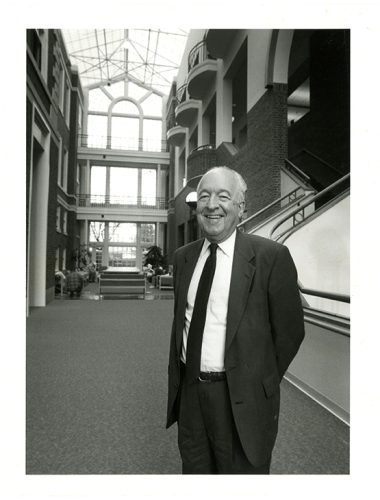Last week in her Dr. Wilson birthday post (happy 101, Dr. Wilson!), Tanya mentioned the two record collections that Special Collections and Archives have with his materials: Dean of the College. Edwin Graves Wilson Records (RG4.1.8) and Office of the Provost. Edwin Graves Wilson Records (RG22.1.1). I know it is a little confusing to split his work into two collections, but Dr. Wilson’s life and career have taken many turns through Wake Forest, and the records reflect these various roles.

So I’d like to tell you a bit about the two collections, to let you know what you might find in each now that both have new additions.
In Dean of the College. Edwin Graves Wilson Records (RG4.1.8), researchers will find materials related to his early years, in his hometown of Leaksville, N.C., a small town in Rockingham County that’s nearly nestled up against the Virginia border. We hold course materials from this time, including an English notebook; young Ed Wilson was also an ardent scrapbooker, and this collection contains volumes that span from his early life through his years of World War II service, documenting the news that he found important to collect. Speaking of his military service, records from his years in the U.S. Navy document that time: letters to friends and his parents, clippings scrapbooks, and a limited number of photographs and personal notebooks.
Materials in RG4.1.8 then move to Wilson’s years studying at Harvard and returning to Wake Forest to teach. There, his path crossed with young Archie Ammons (class of 1949), who became a lifelong friend to Ed and Emily. The correspondence continues, as do the teaching notes related to various courses and specific authors and poets. As the collection crosses into the 1960s, we see the evidence of his tenure as Dean, which began in 1958 – subject files on topics important to the University as a whole, rather than solely the occupations of a professor. As Dean, Wilson also maintained a set of files regarding colleges and universities located near and far. When his years as Dean ended in 1967 with a promotion to Provost, this collection ends as well.
Enter stage left (no bears pursuing), Office of the Provost. Edwin Graves Wilson Records (RG22.1.1). Wilson served 24 years as Provost before moving into different Vice President positions in the 1990s and 2000s. These materials are somewhat more career focused, documenting departments and committees across the undergraduate College and graduate schools, personnel including faculty members, speeches and other prepared remarks Wilson gave, and audio and video recordings of various appearances. Correspondence was a constant in pre-email life (or so it seems to this millennial) and Dr. Wilson’s collection contains letters sent as well as received; the received letters are professional as well as personal, while the letters he sent tend to be administrative. Materials showing some of Dr. Wilson’s personal life – his marriage, family ties, warm friendships – remain but are evidenced by artifacts as much as letters or photos. For example, a series of handmade buttons, date unknown, document birthdays, celebrations, and important sports games. Connections to Leaksville remain, as well, seen in videotapes of class reunions and speeches given to civic groups in town. Dr. Wilson’s involvement in college sports governance, N.C.A.A. as well as A.C.C., are seen in the many artifacts from the winning teams of the 1990s and 2000s.
In our Digital Collections, materials from both collections are available together in the Edwin Graves Wilson Collection. There you will find audio of Dr. Wilson reading poetry, and in the coming months, recordings of him teaching poetry will be added as well. Photographs and other writings and speeches are also available.
Many thanks to our former Archives Assistant Finley Turner, who did a great deal of processing work, funded by generous donors. It’s been a pleasure getting to know both “Mr. Wake Forest” and Wake Forest through Dr. Wilson’s records.

5 Comments on ‘A Look at Dr. Wilson’s Archival Collections’
Thanks Stephanie (and Finley) for making Dr. Wilson’s papers available for researchers!
This is such a rich collection. Thanks for giving us an idea of the contents and overall idea of what is inside.
Very interesting! Thanks for this post, Stephanie!
Thank you for providing this overview, Stephanie! I have always been curious about the differences between these two collections. Now I can handle the boxes with more familiarity than before.
Thank you for this valuable explanation of the two collections.